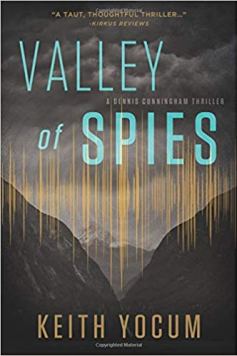If you’re searching for a great espionage thriller, look no further than Keith Yocum’s Valley of Spies.
It all starts when an American tourist vanishes in New Zealand. Investigators don’t find a body, leading them to believe she’s still alive, but with no witnesses, they struggle to identify suspects or even establish a motive. Back in the states, though, the level of concern is elevated when it’s revealed that the tourist was actually a psychologist who treats members of the Central Intelligence Agency, making her a potential ticking time bomb due to the fact that she holds classified secrets from various agency personnel who’ve confided to her over the years.
To asses whether the woman’s disappearance is merely foul play or a much more egregious act by another foreign intelligence service, the CIA tasks Dennis Cunningham (who first appeared in Yocum’s 2016 novel Color of Blood and in last year’s A Dark Place) with finding answers . . . fast.
Though his first two books in the series have been well-received, Yocum has found critical acclaim with his latest thriller, earning a starred review from Kirkus, who also named Valley of Spies one of the best indie books of the month of July. I recently caught up with him to discuss his new novel, and asked him about everything from how he came up with the story idea for this book to what readers can expect from Cunningham going forward. See the full Q&A below, then click here to order your copy of Valley of Spies, now available.

TRBS: Congratulations on the publication of your third Dennis Cunningham novel. How did you come up with the plot details for Valley of Spies?
Yocum: There were two narrative threads that I wanted to bring together in “Valley.” The first being the existence throughout the world of electronic eavesdropping facilities sitting next to bucolic surroundings. There is one such spy station sitting in a lovely valley in the South Island of New Zealand that I heard about last time I was there. The second story thread being the strange conundrum of intelligence employees seeking psychological counseling. Being married to a psychologist and having lots of psychologist friends, it made for some interesting “what ifs.” Both narrative lines run through “Valley of Spies,” and I think it worked nicely.
TRBS: What’s your writing process like, and how much research did you have to do for this book before actually sitting down to write?
Yocum: Regarding the process, I try to write most mornings and will wind up my Australian grandfather’s pocket watch and place it in front of my keyboard. It must be wound daily, so the ritual reminds me of my connection to him and my family. Regarding research, authenticity is critical in the espionage genre, so I do a lot of reading, visiting and interviewing. My protagonist is an investigator in the CIA’s office of inspector general. The IG role at Langley is intriguing and interesting since the IG reports to BOTH Congress and the CIA Director. And of course, an IG investigator is despised and avoided by the rank and file, which is further fodder for tension. For research on “Valley”, I visited the Marlborough Valley in New Zealand where some action takes place, and have visited Perth, Western Australia, Las Vegas, NV, and the Washington, D.C. area where most of the other action takes place. I was also able to vet some of the Las Vegas scenes with a retired Las Vegas police detective who was very helpful. Being a former newspaper reporter-editor, I feel you can never do too much background reporting.
TRBS: Who are some of your favorite authors, and what was the last really great book that you read?
Yocum: Le Carre´ (for his writerly passion and prodigious research), Hemingway (simple declarative sentence structure, less is more with him), Henning Mankell and Jo Nesbo (something about Nordic doom and transgression comes to life with them), David Ignatius (does his research exceptionally well to put the reader in situ). Last great piece of fiction I read was the Pulitzer Prize-winning “The Sympathizer,” by Viet Thanh Nguyen. His writing was searingly funny and biting at the same time.
TRBS: What advice do you have for aspiring authors?
Yocum: Read a lot, write a lot, then get honest feedback. Rinse. Repeat cycle.
TRBS: Lastly, what’s next for you moving forward, and when can fans expect to see Cunningham again?
Yocum: I’m finishing a fictional espionage “memoir” that takes place in 1958 in Panama during the Cold War. I always wanted to work in some personal experiences of my atypical youth into a story. I grew up in the Panama Canal Zone. In May 1958 my elementary school – and me – was accidentally teargassed in student-led Panamanian riots. For years I often wondered what happened during those riots and the US response to them. For this novel, tentatively titled “Miraflores,” I revisited Panama, toured the University of Panama, and spent many hours in the US Archives in Washington, reading through news reports and other materials about those riots and perceived US threats by communist insurgents. I have a good story percolating about a young CIA caseworker, fresh out of training, being dispatched undercover at the university as an English Lit teacher to identify leftist student cells. After that, I’ll dig back into the Dennis Cunningham series to see if I can keep him and his Australian cop girlfriend out of more trouble, which they seem to find without trying.
Praised as “One of the hardest working, most thoughtful, and fairest reviewers out there” by #1 New York Times bestselling author Lisa Scottoline, Ryan Steck has “quickly established himself as the authority on mysteries and thrillers” (Author A.J. Tata). Steck also works full-time as a freelance editor and pens a monthly thriller column for CrimeReads. For more information, be sure to follow him on Twitter and Facebook. He currently lives in Southwest Michigan with his wife and their six children.
